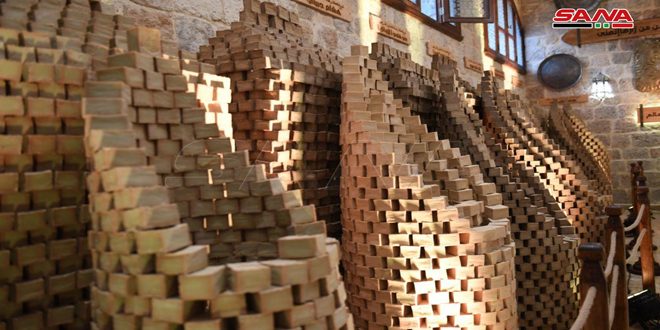Opening soap Khan in Aleppo after its rehabilitation, and manufacturing largest bar of soap in the world
The smell of soap has returned to the old city of Aleppo in the Soap Khan, which has been re-operated today after being restored and rehabilitated as a result of the destruction and devastation of its old stones, wooden ceilings, doors and traditional components due to terrorism.
The Soap Khan presents the creativity of the soap makers (Sheikh al-Kar), and characterizes the city with laurel which Aleppo has become famous for. So that today it is distinguished by the manufacture of the largest bar of soap in the world weighing 1520 kilograms.
Sharaf Al-Din Dahan, director of marketing and production of the Soap Khan said to SANA reporter that the khan was destroyed and ruined by terrorists. The work has been restored and rehabilitated to preserve the ancestral profession and to tell the story of what fathers inherited from their ancestors in this ancient industry.
 Ahmed Madrati, the supervisor of the restoration work in the Khan, underscored the archaeological importance of the khan, which was restored according to its old urban style and identity as the most famous khans of Aleppo while adhering to the technical conditions and specifications specified by the Directorate of Antiquities and Museums in terms of the use of ancient archaeological stones and the wooden ceilings of the rooms. The external courtyard of the khan was also restored and paved to tell the story of 520 years of the Khan’s life.
Ahmed Madrati, the supervisor of the restoration work in the Khan, underscored the archaeological importance of the khan, which was restored according to its old urban style and identity as the most famous khans of Aleppo while adhering to the technical conditions and specifications specified by the Directorate of Antiquities and Museums in terms of the use of ancient archaeological stones and the wooden ceilings of the rooms. The external courtyard of the khan was also restored and paved to tell the story of 520 years of the Khan’s life.
The wheel of reconstruction continues in the markets and khans of the ancient city of Aleppo. The Soap Khan is an important part of the old city of Aleppo which has been re-operated as many of the markets of al-Saqatiyah, al-Khabiya, al-Zahrawi, and Khan al-Jomrok.
Inas Abdulkareem

